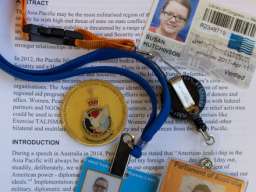ANU student tells UN, US Navy College about women’s role in resolving conflict

Susan Hutchinson, second from right, and her fellow WILPF members at the UN Commission on Women, New York.
A College of Arts and Social Sciences PhD student recently helped Australian delegates at the United Nations who reached a deal at 3am on the role of women in international relations.
Susan Hutchinson’s six week trip included addressing experts at the United States Naval War College and Washington DC about her research on women, peace and security in the South Pacific.
“It was an absolutely incredible experience,” said Susan, a former soldier who has also worked in defence policy and civil society roles in Canberra.
Susan spent two weeks at the UN Commission on the Status of Women meeting as a delegate for the Women’s International League for Peace and Freedom, of which she is the ACT Convenor.
The Commission is the leading international forum for discussing women’s issues and this year the topics included 20 years since the Beijing Platform for Action, a document outlining women’s rights.
The School of Politics and International Relations student participated in negotiations for a resolution about the future of the Commission, which passed.
She was among six people who helped the Australian government delegation ensure some of Australia’s main concerns about gender equality and human rights were included.
“It’s called hallway diplomacy, so we’d stay out in the hallway while they’re in formal negotiations,” Susan recalled.
“They’d come out and seek advice from us on particular issues as they occur. We’d say: ‘no, you can’t give way on that point, and here’s why. But if you have to lose out on that point, these are the core concerns we have’.
“The day before, I’d been in that same negotiating room and it’s terrible. It’s incredibly hot and stuffy and really lacks oxygen.”
Her time in Washington included being a Visiting Fellow at the Institute for Inclusive Security which supports women’s leadership to help prevent violence, stop war, and restore communities after deadly conflicts.
Susan presented her paper on an Australian case study of civil society engagement with government on enacting a national action plan on women, peace and security.
“They were also very interested in my PhD research, in the fact I’m talking about why a defence force needs to be concerned with these issues…and the approaches I was taking to make these issues resonate with them.”
She also met the ANU North America liaison officer based at the Australian embassy who helped her forge connections with other academics and institutions.
Susan’s trip concluded at a conference hosted by the Naval War College in Rhode Island, where her paper based on her preliminary PhD research was accepted.
“I spoke with a range of senior military, diplomatic and academic professionals about my research and made some incredible connections with leaders in policy and academia.”
Those links will help her research and also with the three international relations tutorials she leads.
“My students were absolutely fascinated about how the whole system worked, how strongly Australia pushed a human rights approach, how closely they worked with New Zealand,” Susan said.
While at the Commission, Susan gained access to the WomanStats project database which she plans to incorporate in her research project.
Susan also hopes to bring the project’s founder to the ANU to deliver public lectures and address graduates about measuring the relationship between the status of women and the fate of nations.
Postscript: Susan's trip was made possible with funding from the ANU Gender Institute, Research School of Social Sciences and the School of Politics and International Relations.


